Featured Articles
Literary Notes

 Joe Gans was relegated long ago to a seldom-visited corner of boxing history.
Joe Gans was relegated long ago to a seldom-visited corner of boxing history.
Knowledgeable fight fans know that Gans was the first American-born black champion and perhaps the most technically advanced fighter of his time. Between October 23, 1893, and March 12, 1909, he had 191 professional bouts, scored an even 100 knockouts, and (including newspaper decisions) lost only 12 times. Fifteen months after retiring from the ring, he died of tuberculosis, which had almost certainly hindered him late in his career.
Now, thanks to The Longest Fight by William Gildea (Farrar Straus and Giroux), Gans comes to life again.
The Longest Fight will enhance any reader’s appreciation and understanding of Gans. Gildea crafts a sense of time and place and a moving personal portrait of his subject. The heart of the story, he writes, “is what it was like a century ago to be black in America, to be a black boxer, to be the first black athlete to successfully cross the nation’s gaping racial divide, to give early-twentieth-century African Americans hope.”
The book is keyed to the historic first fight between Gans and Battling Nelson, which took place in Goldfield, Nevada, on September 3, 1906. Gans was lightweight champion by virtue of having knocked out Frank Erne in one round four years earlier. At age thirty-one, he was past his prime. Nelson was twenty-four and peaking. Gans-Nelson was contracted as a fight to a finish. It was to continue until one of the combatants was counted out or quit on his stool.
There had been “mixed race” fights before Gans-Nelson, but never one of this magnitude. The bout attracted national attention. Arrangements were made for round-by-round summaries to be disseminated by telegraph throughout the country.
Gans was a gracious well-spoken man, gentle outside the ring, meticulous in appearance and partial to three-piece suits. Nelson was a thug. The champion, in contrast to his opponent, showed such good sportmanship in the days leading up to the fight (and during the fight itself) that a substantial number of white spectators found themselves openly rooting for him.
The bout lasted two hours forty-eight minutes, making it the longest championship fight of the twentieth century. It began in the Nevada desert at 3:23 PM under a broiling sun with temperatures in excess of one hundred degrees and ended at 6:11 PM.
Gans dominated for most of contest. The granite-jawed Nelson committed virtually every foul in the book while being beaten to a bloody pulp and was disqualified by referee George Siler for repeated deliberate low blows in the forty-second round. Most likely, the champion would have knocked his foe out earlier but for the fact that he broke his right hand in the thirty-third round.
Gans emerged from the Nelson fight as a national figure.
“People had begun to take boxing seriously, even though it was illegal in most places,” Gildea writes. “Its appeal was in its simplicity, its violence, and the glamourous figures it produced. Beating Nelson made Gans prominent in a way no other black athlete had been. Money followed the fame. White fighters suddenly realized that a black man could make them a good payday. Promoters vied to gain his attention. Newspaper editorial page writers, who had ignored not only black boxers but virtually the entire black American experience, gave space to Gans.”
After beating Nelson, Gans became the first black man in his home town of Baltimore to own an automobile; a bright red Matheson touring car with a canvas top that he parked outside a hotel and saloon named The Goldfield that he opened in 1907. A half-century later, emulating Gans, Sugar Ray Robinson would park his own fuchsia Cadillac convertible outside Sugar Ray’s Café in Harlem.
Gans also accepted an offer of $6,000 a month for a midwestern vaudeville tour. Putting that number in perspective, Ty Cobb was paid $4,800 for the entire 1908 season one year after he led the American League in hits, batting average, and RBIs.
Gans lost his championship in a rematch against Nelson on July 4, 1908. He receded further into the background with the ascendance of Jack Johnson to the heavyweight throne at the end of that year. But by then, the ripples from his life had spread throughout America.
In Gildea’s words, “Gans was the first African American, after horse racing’s early black jockeys and the cyclist Major Taylor, whose athletic ability even hinted at the possibility that sports could be a springboard for racial justice in American life.”
How good was Gans?
Bob Fitzsimmons called him “the cleverest fighter, big or little, that ever put on a glove.” And Sam Langford said of Joe Louis at his peak, “He can hit. He is fast and is no slouch at employing ring craft. He is the marvel of the age. I consider him another Gans.”
It should also be noted that Gans inspired people in many ways. Goldfield was America’s last mining boomtown. It was short on hotel accommodations, leaving thousands of fight fans to sleep in tents or on hard ground under the starry sky. But it had fifty-three saloons to keep them well-lubricated.
One of those saloons was owned by George Lewis Rickard, better known as “Tex”. It was Rickard who had first suggested to local businessmen that the publicity flowing from a major fight would attract investment capital to Goldfield for mining-related ventures.
Gans-Nelson was Rickard’s maiden voyage into big-time promoting. “I never knew what the fight game offered until then,” he acknowledged later. “I wasn’t a boxing expert. But what happened in the Gans-Nelson show made me think.”
In later years, Rickard would promote the first five fights in boxing history with gates in excess of $1,000,000; build Jack Dempsey into a superstar before the term existed; head a group that financed construction of a new Madison Square Garden on Eighth Avenue between 49th and 50th Streets in Manhattan; and play a key role in making New York City the boxing capitol of the world.
* * *
Al Bernstein has been calling fights on television, most often as an expert analyst, for more than thirty years. The job requires an understanding of the sweet science and the ability to communicate well. But the most successful analysts have an additional quality. Viewers think that it would be fun to sit next to them on a sofa and watch a fight on television.
Al Bernstein: 30 Years, 30 Undeniable Truths about Boxing, Sports, and TV (Diversion books) reads like a conversation on the sofa. It’s a collection of recollections and anecdotes about Al’s life and the sport he loves. There’s a moving section about Connie Bernstein’s long battle with cancer and the strength of the marriage that she and Al share. And there are portraits of boxers, from legendary greats to four-round club fighters.
In one of my favorite anecdotes, Bernstein recounts how he and Charley Steiner covered the weigh-in for Mike Tyson’s 1995 comeback bout against Peter McNeeley. Al was on-camera and told his ESPN audience, “Let’s see if we can hear from former heavyweight champion, Mike Tyson. Mike, can we talk to you now?”
“No fucking way,” Tyson answered.
Bernstein reflected on the moment and said calmly, “I’ll take that as a ‘no’. Back to you, Charley.”
“After more than two decades of trying to explain Tyson’s chaotic behavior,” Bernstein writes, “we are left with the simple explanation – he’s a nut.”
In the most interesting passage in the book, Al recalls hall-of-fame announcer Don Dunphy telling him, “The best advice I can give you as a sportscaster is to remember, when you are on the air, it’s not about you.”
Bernstein then casts aside his non-confrontational persona and declares, “The majority of sportscasters working today believe it is always about them. Amazingly, they do so with the endorsement and even encouragement of their networks and their producers. We live in a time when most networks value argument over discussion, opinion over information, and loudness over intelligence. While I don’t take myself too seriously, I take sportscasting very seriously. My claim that sportcasting has changed dramatically (not for the better) is not some idle statement or sentimental bromide about ‘the good old days.’ It’s a well-considered assessment of my profession. I am hardly known as a combative personality. I have steadfastly refused to criticize my colleagues over the years, so writing this is out of character for me. I hope that my reputation will give my words in this chapter even more meaning.”
“We have seen many major boxing matches,” Bernstein continues, “where three broadcasters are debating amongst themselves something only vaguely related to the match we are all watching. This debate has been known to extend for almost an entire three-minute round, while the action in the ring goes virtually unnoticed. An offshoot of this is the use of opinion to replace analysis. ‘Analyst’ is the title of the person sitting next to the host or play-by-play announcer. The title is not ‘opinion giver.’ Opinions may be part of some type of analysis, but pure opinion is never to be confused with analysis. Using opinion under the guise of calling it analysis is often the sign that a color commentator is too lazy to do the homework necessary to provide real analysis. Anyone can have an opinion on anything. Analysis is using knowledge of an athlete or team to explain something that has just happened or foreshadow something that might happen. Being considered an expert does not give you the right to do nothing but blurt out opinions to viewers. More than that is required from an analyst of a sporting event.”
Thomas Hauser can be reached by email at thauser@rcn.com. His newest book (And the New: An Inside Look at Another Year in Boxing) will be published later this summer by the University of Arkansas Press.
Featured Articles
Avila Perspective, Chap. 323: Benn vs Eubank Family Feud and More

Next generation rivals Conor Benn and Chris Eubank Jr. carry on the family legacy of feudal warring in the prize ring on Saturday.
This is huge in British boxing.
Eubank (34-3, 25 KOs) holds the fringe IBO middleweight title but won’t be defending it against the smaller welterweight Benn (23-0, 14 KOs) on Saturday, April 26, at Tottenham Hotspur Stadium in London. DAZN will stream the Matchroom Boxing card.
This is about family pride.
The parents of Eubank and Benn actually began the feud in the 1990s.
Papa Nigel Benn fought Papa Chris Eubank twice. Losing as a middleweight in November 1990 at Birmingham, England, then fighting to a draw as a super middleweight in October 1993 in Manchester. Both were world title fights.
Eubank was undefeated and won the WBO middleweight world title in 1990 against Nigel Benn by knockout. He defended it three times before moving up and winning the vacant WBO super middleweight title in September 1991. He defended the super middleweight title 14 times before suffering his first pro defeat in March 1995 against Steve Collins.
Benn won the WBO middleweight title in April 1990 against Doug DeWitt and defended it once before losing to Eubank in November 1990. He moved up in weight and took the WBC super middleweight title from Mauro Galvano in Italy by technical knockout in October 1992. He defended the title nine times until losing in March 1996. His last fight was in November 1996, a loss to Steve Collins.
Animosity between the two families continues this weekend in the boxing ring.
Conor Benn, the son of Nigel, has fought mostly as a welterweight but lately has participated in the super welterweight division. He is several inches shorter in height than Eubank but has power and speed. Kind of a British version of Gervonta “Tank” Davis.
“It’s always personal, every opponent I fight is personal. People want to say it’s strictly business, but it’s never business. If someone is trying to put their hands on me, trying to render me unconscious, it’s never business,” said Benn.
This fight was scheduled twice before and cut short twice due to failed PED tests by Benn. The weight limit agreed upon is 160 pounds.
Eubank, a natural middleweight, has exchanged taunts with Benn for years. He recently avenged a loss to Liam Smith with a knockout victory in September 2023.
“This fight isn’t about size or weight. It’s about skill. It’s about dedication. It’s about expertise and all those areas in which I excel in,” said Eubank. “I have many, many more years of experience over Conor Benn, and that will be the deciding factor of the night.”
Because this fight was postponed twice, the animosity between the two feuding fighters has increased the attention of their fans. Both fighters are anxious to flatten each other.
“He’s another opponent in my way trying to crush my dreams. trying to take food off my plate and trying to render me unconscious. That’s how I look at him,” said Benn.
Eubank smiles.
“Whether it’s boxing, whether it’s a gun fight. Defense, offense, foot movement, speed, power. I am the superior boxer in each of those departments and so many more – which is why I’m so confident,” he said.
Supporting Bout
Former world champion Liam Smith (33-4-1, 20 KOs) tangles with Ireland’s Aaron McKenna (19-0, 10 KOs) in a middleweight fight set for 12 rounds on the Benn-Eubank undercard in London.
“Beefy” Smith has long been known as one of the fighting Smith brothers and recently lost to Eubank a year and a half ago. It was only the second time in 38 bouts he had been stopped. Saul “Canelo” Alvarez did it several years ago.
McKenna is a familiar name in Southern California. The Irish fighter fought numerous times on Golden Boy Promotion cards between 2017 and 2019 before returning to the United Kingdom and his assault on continuing the middleweight division. This is a big step for the tall Irish fighter.
It’s youth versus experience.
“I’ve been calling for big fights like this for the last two or three years, and it’s a fight I’m really excited for. I plan to make the most of it and make a statement win on Saturday night,” said McKenna, one of two fighting brothers.
Monster in L.A.
Japan’s super star Naoya “Monster” Inoue arrived in Los Angeles for last day workouts before his Las Vegas showdown against Ramon Cardenas on Sunday May 4, at T-Mobile Arena. ESPN will televise and stream the Top Rank card.
It’s been four years since the super bantamweight world champion performed in the US and during that time Naoya (29-0, 26 KOs) gathered world titles in different weight divisions. The Japanese slugger has also gained fame as perhaps the best fighter on the planet. Cardenas is 26-1 with 14 KOs.
Pomona Fights
Super featherweights Mathias Radcliffe (9-0-1) and Ezequiel Flores (6-4) lead a boxing card called “DMG Night of Champions” on Saturday April 26, at the historic Fox Theater in downtown Pomona, Calif.
Michaela Bracamontes (11-2-1) and Jesus Torres Beltran (8-4-1) will be fighting for a regional WBC super featherweight title. More than eight bouts are scheduled.
Doors open at 6 p.m. For ticket information go to: www.tix.com/dmgnightofchampions
Fights to Watch
Sat. DAZN 9 a.m. Conor Benn (23-0) vs Chris Eubank Jr. (34-3); Liam Smith (33-4-1) vs Aaron McKenna (19-0).
To comment on this story in the Fight Forum CLICK HERE
Featured Articles
Floyd Mayweather has Another Phenom and his name is Curmel Moton
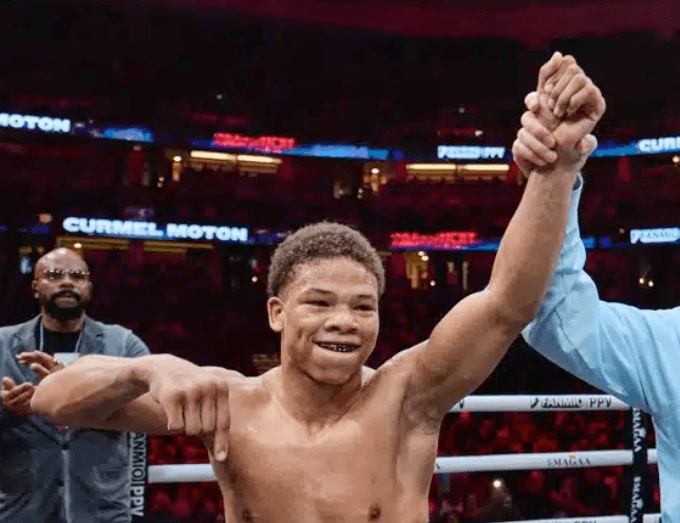
Floyd Mayweather has Another Phenom and his name is Curmel Moton
In any endeavor, the defining feature of a phenom is his youth. Philadelphia Phillies outfielder Bryce Harper was a phenom. He was on the radar screen of baseball’s most powerful player agents when he was 14 years old.
Curmel Moton, who turns 19 in June, is a phenom. Of all the young boxing stars out there, wrote James Slater in July of last year, “Curmel Moton is the one to get most excited about.”
Moton was born in Salt Lake City, Utah. His father Curtis Moton, a barber by trade, was a big boxing fan and specifically a big fan of Floyd Mayweather Jr. When Curmel was six, Curtis packed up his wife (Curmel’s stepmom) and his son and moved to Las Vegas. Curtis wanted his son to get involved in boxing and there was no better place to develop one’s latent talents than in Las Vegas where many of the sport’s top practitioners came to train.
Many father-son relationships have been ruined, or at least frayed, by a father’s unrealistic expectations for his son, but when it came to boxing, the boy was a natural and he felt right at home in the gym.
The gym the Motons patronized was the Mayweather Boxing Club. Curtis took his son there in hopes of catching the eye of the proprietor. “Floyd would occasionally drop by the gym and I was there so often that he came to recognize me,” says Curmel. What he fails to add is that the trainers there had Floyd’s ear. “This kid is special,” they told him.
It costs a great deal of money for a kid to travel around the country competing in a slew of amateur boxing tournaments. Only a few have the luxury of a sponsor. For the vast majority, fund raisers such as car washes keep the wheels greased.
Floyd Mayweather stepped in with the financial backing needed for the Motons to canvas the country in tournaments. As an amateur, Curmel was — take your pick — 156-7 or 144-6 or 61-3 (the latter figure from boxrec). Regardless, at virtually every tournament at which he appeared, Curmel Moton was the cock of the walk.
Before the pandemic, Floyd Mayweather Jr had a stable of boxers he promoted under the banner of “The Money Team.” In talking about his boxers, Floyd was understated with one glaring exception – Gervonta “Tank” Davis, now one of boxing’s top earners.
When Floyd took to praising Curmel Moton with the same effusive language, folks stood up and took notice.
Curmel made his pro debut on Sept. 30, 2023, at the T-Mobile Arena in Las Vegas on the undercard of the super middleweight title fight between Canelo Alvarez and Jermell Charlo. After stopping his opponent in the opening round, he addressed a flock of reporters in the media room with Floyd standing at his side. “I felt ready,” he said, “I knew I had Floyd behind me. He believes in me. I had the utmost confidence going into the fight. And I went in there and did what I do.”
Floyd ventured the opinion that Curmel was already a better fighter than Leigh Wood, the reigning WBA world featherweight champion who would successfully defend his belt the following week.
Moton’s boxing style has been described as a blend of Floyd Mayweather and Tank Davis. “I grew up watching Floyd, so it’s natural I have some similarities to him,” says Curmel who sparred with Tank in late November of 2021 as Davis was preparing for his match with Isaac “Pitbull” Cruz. Curmell says he did okay. He was then 15 years old and still in school; he dropped out as soon as he reached the age of 16.
Curmel is now 7-0 with six KOs, four coming in the opening round. He pitched an 8-round shutout the only time he was taken the distance. It’s not yet official, but he returns to the ring on May 31 at Mandalay Bay in Las Vegas where Caleb Plant and Jermall Charlo are co-featured in matches conceived as tune-ups for a fall showdown. The fight card will reportedly be free for Amazon Prime Video subscribers.
Curmel’s presumptive opponent is Renny Viamonte, a 28-year-old Las Vegas-based Cuban with a 4-1-1 (2) record. It will be Curmel’s first professional fight with Kofi Jantuah the chief voice in his corner. A two-time world title challenger who began his career in his native Ghana, the 50-year-old Jantuah has worked almost exclusively with amateurs, a recent exception being Mikaela Mayer.
It would seem that the phenom needs a tougher opponent than Viamonte at this stage of his career. However, the match is intriguing in one regard. Viamonte is lanky. Listed at 5-foot-11, he will have a seven-inch height advantage.
Keeping his weight down has already been problematic for Moton. He tipped the scales at 128 ½ for his most recent fight. His May 31 bout, he says, will be contested at 135 and down the road it’s reasonable to think he will blossom into a welterweight. And with each bump up in weight, his short stature will theoretically be more of a handicap.
For fun, we asked Moton to name the top fighter on his pound-for-pound list. “[Oleksandr] Usyk is number one right now,” he said without hesitation,” great footwork, but guys like Canelo, Crawford, Inoue, and Bivol are right there.”
It’s notable that there isn’t a young gun on that list. Usyk is 38, a year older than Crawford; Inoue is the pup at age 32.
Moton anticipates that his name will appear on pound-for-pound lists within the next two or three years. True, history is replete with examples of phenoms who flamed out early, but we wouldn’t bet against it.
To comment on this story in the Fight Forum CLICK HERE
Featured Articles
Arne’s Almanac: The First Boxing Writers Assoc. of America Dinner Was Quite the Shindig
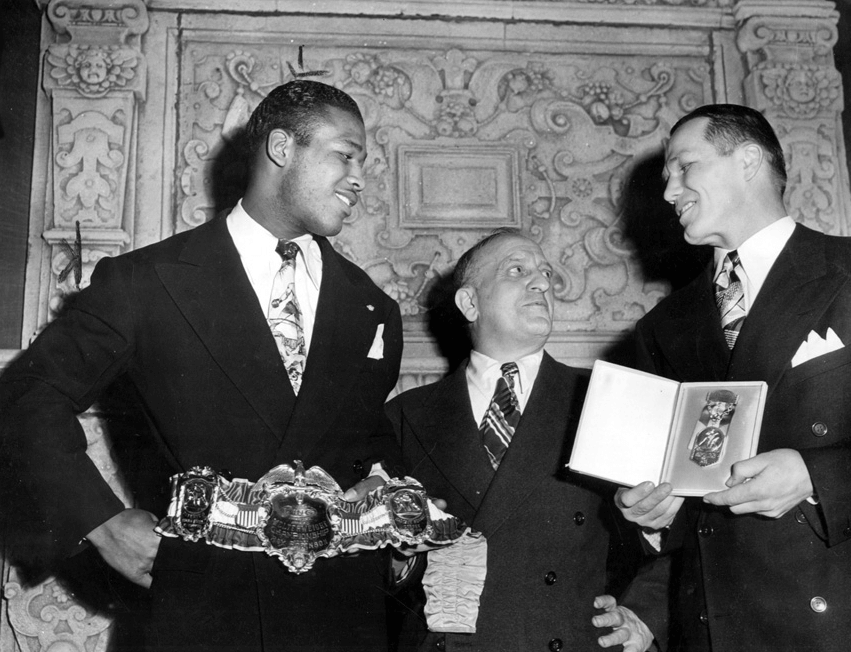
The first annual dinner of the Boxing Writers Association of America was staged on April 25, 1926 in the grand ballroom of New York’s Hotel Astor, an edifice that rivaled the original Waldorf Astoria as the swankiest hotel in the city. Back then, the organization was known as the Boxing Writers Association of Greater New York.
The ballroom was configured to hold 1200 for the banquet which was reportedly oversubscribed. Among those listed as agreeing to attend were the governors of six states (New York, New Jersey, Massachusetts, Pennsylvania, Connecticut, and Maryland) and the mayors of 10 of America’s largest cities.
In 1926, radio was in its infancy and the digital age was decades away (and inconceivable). So, every journalist who regularly covered boxing was a newspaper and/or magazine writer, editor, or cartoonist. And at this juncture in American history, there were plenty of outlets for someone who wanted to pursue a career as a sportswriter and had the requisite skills to get hired.
The following papers were represented at the inaugural boxing writers’ dinner:
New York Times
New York News
New York World
New York Sun
New York Journal
New York Post
New York Mirror
New York Telegram
New York Graphic
New York Herald Tribune
Brooklyn Eagle
Brooklyn Times
Brooklyn Standard Union
Brooklyn Citizen
Bronx Home News
This isn’t a complete list because a few of these papers, notably the New York World and the New York Journal, had strong afternoon editions that functioned as independent papers. Plus, scribes from both big national wire services (Associated Press and UPI) attended the banquet and there were undoubtedly a smattering of scribes from papers in New Jersey and Connecticut.
Back then, the event’s organizer Nat Fleischer, sports editor of the New York Telegram and the driving force behind The Ring magazine, had little choice but to limit the journalistic component of the gathering to writers in the New York metropolitan area. There wasn’t a ballroom big enough to accommodate a good-sized response if he had extended the welcome to every boxing writer in North America.
The keynote speaker at the inaugural dinner was New York’s charismatic Jazz Age mayor James J. “Jimmy” Walker, architect of the transformative Walker Law of 1920 which ushered in a new era of boxing in the Empire State with a template that would guide reformers in many other jurisdictions.
Prizefighting was then associated with hooligans. In his speech, Mayor Walker promised to rid the sport of their ilk. “Boxing, as you know, is closest to my heart,” said hizzoner. “So I tell you the police force is behind you against those who would besmirch or injure boxing. Rowdyism doesn’t belong in this town or in your game.” (In 1945, Walker would be the recipient of the Edward J. Neil Memorial Award given for meritorious service to the sport. The oldest of the BWAA awards, the previous recipients were all active or former boxers. The award, no longer issued under that title, was named for an Associated Press sportswriter and war correspondent who died from shrapnel wounds covering the Spanish Civil War.)
Another speaker was well-traveled sportswriter Wilbur Wood, then affiliated with the Brooklyn Citizen. He told the assembly that the aim of the organization was two-fold: to help defend the game against its detractors and to promote harmony among the various factions.
Of course, the 1926 dinner wouldn’t have been as well-attended without the entertainment. According to press dispatches, Broadway stars and performers from some of the city’s top nightclubs would be there to regale the attendees. Among the names bandied about were vaudeville superstars Sophie Tucker and Jimmy Durante, the latter of whom would appear with his trio, Durante, (Lou) Clayton, and (Eddie) Jackson.
There was a contraction of New York newspapers during the Great Depression. Although empirical evidence is lacking, the inaugural boxing writers dinner was likely the largest of its kind. Fifteen years later, in 1941, the event drew “more than 200” according to a news report. There was no mention of entertainment.
In 1950, for the first time, the annual dinner was opened to the public. For $25, a civilian could get a meal and mingle with some of his favorite fighters. Sugar Ray Robinson was the Edward J. Neil Award winner that year, honored for his ring exploits and for donating his purse from the Charlie Fusari fight to the Damon Runyon Cancer Fund.
There was no formal announcement when the Boxing Writers Association of Greater New York was re-christened the Boxing Writers Association of America, but by the late 1940s reporters were referencing the annual event as simply the boxing writers dinner. By then, it had become traditional to hold the annual affair in January, a practice discontinued after 1971.
The winnowing of New York’s newspaper herd plus competing banquets in other parts of the country forced Nat Fleischer’s baby to adapt. And more adaptations will be necessary in the immediate future as the future of the BWAA, as it currently exists, is threatened by new technologies. If the forthcoming BWAA dinner (April 30 at the Edison Ballroom in mid-Manhattan) were restricted to wordsmiths from the traditional print media, the gathering would be too small to cover the nut and the congregants would be drawn disproportionately from the geriatric class.
Some of those adaptations have already started. Last year, Las Vegas resident Sean Zittel, a recent UNLV graduate, had the distinction of becoming the first videographer welcomed into the BWAA. With more and more people getting their news from sound bites, rather than the written word, the videographer serves an important function.
The reporters who conducted interviews with pen and paper have gone the way of the dodo bird and that isn’t necessarily a bad thing. A taped interview for a “talkie” has more integrity than a story culled from a paper and pen interview because it is unfiltered. Many years ago, some reporters, after interviewing the great Joe Louis, put words in his mouth that made him seem like a dullard, words consistent with the Sambo stereotype. In other instances, the language of some athletes was reconstructed to the point where the reader would think the athlete had a second job as an English professor.
The content created by videographers is free from that bias. More of them will inevitably join the BWAA and similar organizations in the future.
Photo: Nat Fleischer is flanked by Sugar Ray Robinson and Tony Zale at the 1947 boxing writers dinner.
-
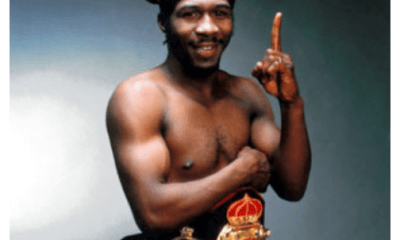
 Featured Articles4 weeks ago
Featured Articles4 weeks agoBoxing Odds and Ends: The Wacky and Sad World of Livingstone Bramble and More
-
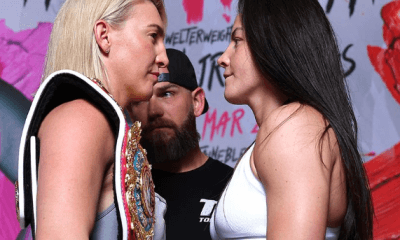
 Featured Articles4 weeks ago
Featured Articles4 weeks agoAvila Perspective, Chap. 319: Rematches in Las Vegas, Cancun and More
-

 Featured Articles4 weeks ago
Featured Articles4 weeks agoRingside at the Fontainebleau where Mikaela Mayer Won her Rematch with Sandy Ryan
-
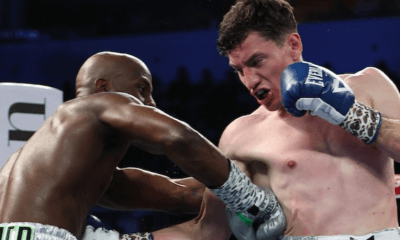
 Featured Articles4 weeks ago
Featured Articles4 weeks agoWilliam Zepeda Edges Past Tevin Farmer in Cancun; Improves to 34-0
-
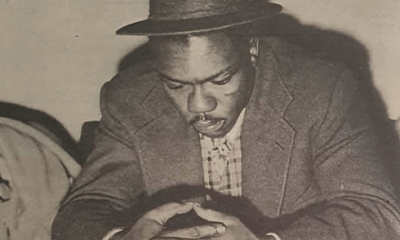
 Featured Articles3 weeks ago
Featured Articles3 weeks agoHistory has Shortchanged Freddie Dawson, One of the Best Boxers of his Era
-
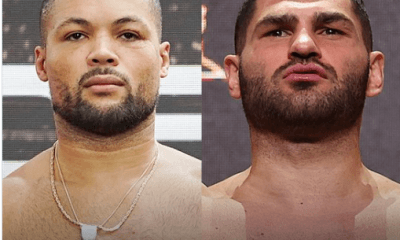
 Featured Articles3 weeks ago
Featured Articles3 weeks agoAvila Perspective, Chap. 320: Women’s Boxing Hall of Fame, Heavyweights and More
-
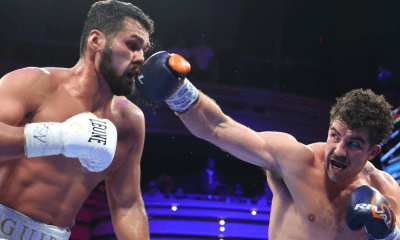
 Featured Articles3 weeks ago
Featured Articles3 weeks agoResults and Recaps from Las Vegas where Richard Torrez Jr Mauled Guido Vianello
-
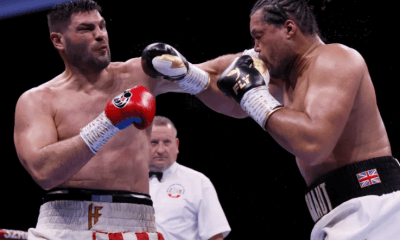
 Featured Articles3 weeks ago
Featured Articles3 weeks agoFilip Hrgovic Defeats Joe Joyce in Manchester















